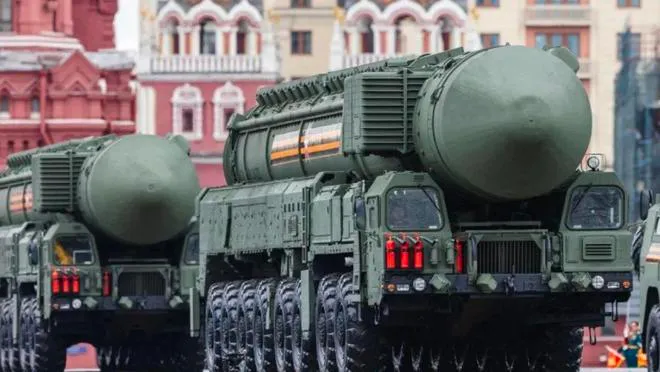俄媒:俄外交部称,俄方完全遵守不可发生核战争的声明
随着冬季来临以及俄军军力得到有效补充,乌军反攻可能受阻,双方力量此消彼长,局势将发生新的变化。
|1 min read

<p>俄媒:俄外交部称,俄方完全遵守不可发生核战争的声明据俄罗斯卫星通讯社4日报道,俄罗斯外交部核不扩散和军控司司长叶尔马科夫在向联合国大会第一委员会的致信中表示,俄罗斯完全遵守拥核五国领导人关于不可发生核战争的声明,该信件由俄罗斯代表团副团长沃伦佐夫宣读。</p> <p>报道称,沃伦佐夫表示:“我们认为,最重要的任务之一是保持五个核武器国家都遵守不允许拥有核武器的国家之间发生任何战争的假设,拥核国家领导人1月份的联合声明中反映出这一点。俄罗斯完全遵守(这一点)。”</p> <p>近来,随着俄乌冲突持续,在使用核武器问题上俄罗斯与美西方国家关系日趋紧张。10月1日,俄车臣共和国领导人卡德罗夫在社交平台曾发文分析俄军战局不利的原因,他还提到“个人见解“,认为俄罗斯应该考虑使用低当量核武器。对此,综合塔斯社、俄新社等多家俄媒报道,俄罗斯总统新闻秘书、克宫发言人佩斯科夫10月3日接受记者采访、谈及卡德罗夫这一言论,他表示“我们是根据相关文件规定使用核武器,除此以外不能有其他任何理由(使用核武器)”。</p> <p>俄乌冲突已经持续了200多天,双方进入胶着状态。俄罗斯国防部表示,俄军打击了多地的乌军部队和弹药库。乌克兰方面则表示,乌武装部队继续在南部推进。</p> <p>就在人们关注之际,俄罗斯国防部官方代表伊戈尔·科纳申科夫中将称,乌克兰武装部队在赫尔松地区的佐洛托伊巴尔卡和亚历山德罗夫卡附近突破了俄军防御。但其在尼古拉耶夫和安德里夫斯克战术方向的攻击均被俄方击退。</p> <p>毫无疑问,乌军在赫尔松突破了俄罗斯的防线。此前,俄军刚刚丢了红利曼。</p> <p>在这样的情况下,难免出现舆论唱衰的声音。当然,我们不可否认的是,俄罗斯目前的确面临一些困境。</p> <p>首先,美国和北约加大了对乌克兰的军事援助。我们看到美国、英国都在向乌克兰提供‘海马斯‘系统,东欧国家以及德国、法国也在向乌克兰“输血”。</p> <p>这无疑让俄乌战争的进展更加缓慢。实际上,美西方对乌克兰的支持还可以追溯到更早的时间。有军事专家就曾透露,2014年之后,北约的一些高级官员以顾问的身份已经进入到乌克兰军队当中。</p> <p>而早在今年2月份,乌俄战事未发生之前,北约便加大对乌克兰军队的扶持,包括作战理论、技术培训、武器装备支持等。</p> <p>更重要的是,乌克兰还从美国获得了情报支持,包括俄军的位置、战线弱点等重要信息。</p> <p>其次,兵力的问题。目前俄军伤亡战损还是颇为严重的。但反观乌克兰方面,俄乌冲突开展之初,乌克兰的正规国防军只有20万人,在国家紧急的战时动员下,军力扩充到80万,尽管质量不高,但数量上的几何级增长给乌克兰了很大信心。</p> <p><img src="“https://i.imgur.com/ukDPN38.png“alt=““/"></p> <p>最后,不得不提的便是近期北溪管道被炸,经济命脉受损对俄罗斯产生重大负面影响。</p> <p>尽管面临一些困难,但普京或早已布局扭转局面。</p> <p>一是乌克兰四地公投或已经改变战争性质。一旦完成乌东四地的公投入俄的“法定程序”,“特别军事行动”随即改变为正义的“卫国战争”。</p> <p>值得一提的是,所谓“公投”不过是美西方国家常用的伎俩,普京也不过是“以彼之道还施彼身”。</p> <p><img src="“https://i.imgur.com/OVzyzII.png“alt=““/"></p> <p>另外,近年来,俄罗斯始终受到人口下降的困扰,根据俄罗斯国家研究型高等经济大学的预计,俄罗斯人口在本世纪末将减少到1.375亿。而在公投后,俄罗斯随即增加数百万人口数量,可谓是“及时雨”。</p> <p>同时亚速海成为内海,并控制了乌克兰的出海口,增强了软实力。</p> <p>随着冬季来临以及俄军军力得到有效补充,乌军反攻可能受阻,双方力量此消彼长,局势将发生新的变化。</p>

